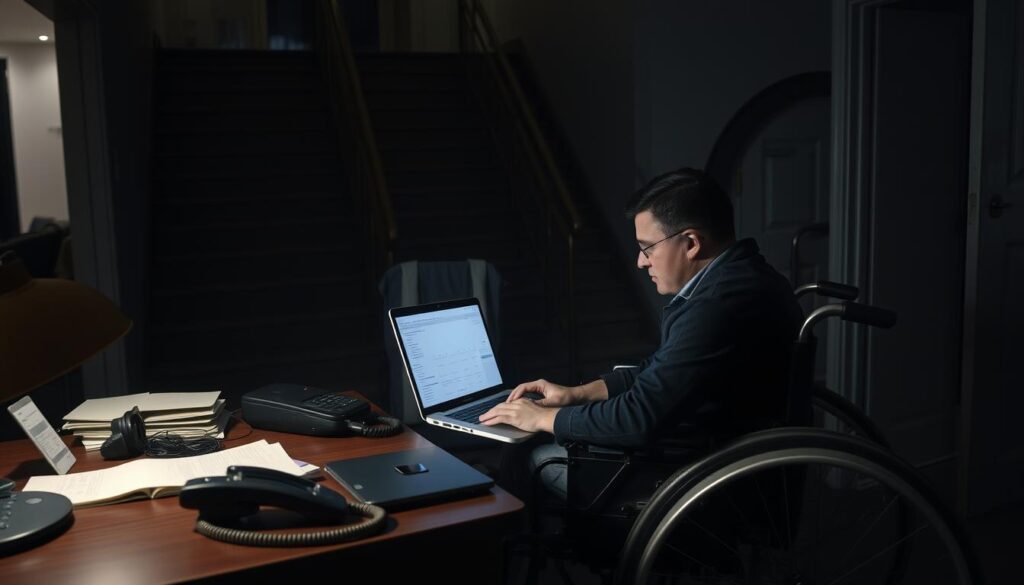Challenges faced by entrepreneurs with disabilities in Brazil
Brazil is known for its rich culture and growing economy. Yet, entrepreneurs with disabilities face many hurdles. They deal with barriers that make starting and running a business tough.
These challenges include socio-economic obstacles and limited access to services. These issues create a difficult environment for disabled entrepreneurs.
Issues like poverty, inequality, and limited education and healthcare affect them more. These problems make it hard for disabled entrepreneurs to succeed. By looking into these challenges, we can better understand the obstacles and find ways to make things better.

Introduction to the Challenges Faced by Entrepreneurs with Disabilities
Entrepreneurs with disabilities in Brazil face many challenges. These include discrimination, lack of accessibility, and no supportive policies. These barriers are complex and widespread.
One big issue is the lack of awareness about the needs of people with disabilities. This makes it hard for them to start and grow businesses. The infrastructure and support systems in Brazil are not designed to include everyone.
Entrepreneurs with disabilities also struggle to get training, mentorship, and funding. It’s important to address these issues to create a fair business environment in Brazil.
To overcome these challenges, everyone needs to work together. Governments, private sectors, and civil society must support disability inclusion in entrepreneurship. This way, we can make sure everyone has a chance to succeed.
Socio-Economic Barriers Impacting Disabled Entrepreneurs
Disabled entrepreneurs in Brazil often face big socio-economic inequalities. Poverty is a big problem, making it hard to get the money needed to start or grow a business. Also, the lack of an inclusive business environment makes things worse.
High unemployment rates among the disabled add to the problem. Many see starting a business as a way to be financially independent. But, societal stigma and places that are hard to get to stand in their way. It’s important to work on making business more accessible and reducing these gaps.
Entrepreneurship Opportunities for Disabled Individuals
Despite challenges, entrepreneurship opportunities for disabled individuals in Brazil are growing. Many initiatives and programs aim to create an inclusive business environment. They offer support tailored to disabled entrepreneurs, helping them compete fairly.
Organizations provide disability-friendly entrepreneurship programs to meet the needs of disabled individuals. These programs include training, grants, and mentorship. They help entrepreneurs learn business skills, get financial support, and find guidance.
- Training Programs: Special training sessions teach essential business skills like management, marketing, and financial planning.
- Grants and Financial Support: Grants offer the financial help needed to start and grow a business.
- Mentorship Opportunities: Experienced mentors provide advice, helping entrepreneurs overcome business challenges.
These efforts ensure disabled individuals have the tools and resources to succeed. By supporting disability-friendly entrepreneurship programs, Brazil is making its business world more inclusive and supportive.
Support for Disabled Entrepreneurs in Brazil
Support for disabled entrepreneurs in Brazil is on the rise. Many programs help them succeed in business. These include financial aid, business advice, and chances to meet others.
The Brazilian disabled entrepreneurs network plays a big role. It hosts events, workshops, and mentorship programs. These offer important resources and connections for growing businesses.
Government programs like the National Entrepreneur Support Program help a lot. They give financial help and training for disabled entrepreneurs. This support helps them face challenges and start strong businesses.
Non-governmental organizations also play a big part. They help get access to tools and resources that might be hard to find. These NGOs work with local and international groups to offer training, marketing help, and legal advice.
The Brazilian disabled entrepreneurs network is also key. It lets members share experiences and learn from each other. This network helps create a supportive place where disabled entrepreneurs can grow and succeed.
The Role of Education in Empowering Disabled Entrepreneurs
Education is key in empowering disabled entrepreneurs. It gives them the skills needed to succeed in a tough market. In Brazil, programs teaching business skills and digital literacy have made a big difference.
Studies show that inclusive education is crucial. It helps disabled people develop an entrepreneurial mindset. By making education accessible, these programs create a space where everyone can thrive.
Vocational training and mentorship for disabled people provide real-world experience. This makes starting a business possible and fulfilling. These efforts are helping build an inclusive economy, boosting diversity and empowerment in business.
In conclusion, education is a powerful tool. It not only helps empowering disabled entrepreneurs but also boosts inclusive growth and innovation in Brazil’s business world.
Challenges in Accessing Financial Support
Getting financial help for disabled entrepreneurs in Brazil is tough. Many want to start businesses but face big hurdles. They struggle to get the money they need to succeed.
There are few credit options, high-interest rates, and no special financial products for them. This makes things even harder.
Even though everyone knows inclusivity is key, Brazil’s funding for startups doesn’t really help disabled entrepreneurs. Most financial services are too general or have too many rules. This means many good businesses don’t get the money they need.
Banks and other financial places often don’t want to help disabled entrepreneurs. They think it’s too risky. They ask for a lot of money upfront and want a lot of collateral. This makes it hard for these entrepreneurs to pay back their loans.
We need financial products and services that really understand the challenges disabled entrepreneurs face. We need to give them fair chances to succeed.
For Brazil to be fair in supporting startups, governments and non-profits must step up. They can offer grants and incentives. This helps disabled entrepreneurs get the money they need to start and keep their businesses going.
We also need to spread the word and push for change. We must make sure that financial support in Brazil is fair for everyone.
| Challenge | Impact | Potential Solution |
|---|---|---|
| Limited Credit Options | Restricts access to startup capital | Develop tailored financial products |
| High-Interest Rates | Increases repayment burden | Offer subsidized interest rates |
| Lack of Tailored Financial Products | Fails to address specific needs | Design inclusive financial services |
The Impact of Social Entrepreneurship in Brazil
Social entrepreneurship in Brazil has changed the country a lot. It focuses on solving big problems like poverty and inequality. This approach is not just a passing trend but a lasting solution.
Disabled entrepreneurs lead the way in these efforts. They use their businesses to make a big difference. They show that even with challenges, there are always new chances.
These businesses mix social goals with business strategies. This helps make society more fair and open to everyone.
The impact of social entrepreneurship is huge. It tackles community problems with solutions that work for everyone. In Brazil, these businesses are often run by the community. This means the benefits go straight to those who need them most.
As more disabled people start their own businesses, we see more creative solutions. This approach helps the economy grow and builds a culture of kindness and teamwork in Brazil.
“Social entrepreneurship is a powerful tool for change. By inclusively addressing societal challenges, it creates opportunities for all, ensuring that nobody is left behind.” – Letícia Lyle, Co-Founder of Floema.
Disabled individuals playing a big role in Brazil’s social businesses shows the power of inclusion and entrepreneurship. Their stories and ideas add depth to social projects across the country.
Creating an Inclusive Business Environment
Creating an inclusive business environment is key for disabled entrepreneurs in Brazil. It means making places more accessible and fostering a culture of inclusion. This also includes anti-discriminatory practices in the workplace. By doing this, businesses can become more welcoming for everyone.
Ensuring physical spaces are accessible is a big part of this. This means having ramps, elevators, and accessible restrooms. These changes help both employees and customers with disabilities feel welcome.
“By investing in accessibility, businesses can create more opportunities for disabled individuals, ultimately contributing to a more inclusive society.” — Source Unknown
Creating a culture of inclusion is also crucial. Businesses should offer training on diversity and inclusion. This helps to break down stereotypes and biases, making the workplace better for everyone.

It’s also important to have anti-discriminatory practices. Companies should have clear policies against discrimination. They should also give equal chances for career growth to all employees, no matter their abilities. This boosts morale and makes the company look good.
Adopting inclusive practices helps both businesses and society. It lets companies use the talents of disabled individuals, leading to innovation and growth. A more inclusive business world means a fairer and more just society for all.
Disabled Entrepreneurs Brazil
In Brazil, many disabled entrepreneurs have overcome obstacles to achieve success. Their stories show their strength and creativity, leading in the business world. These achievements highlight the role of disability in entrepreneurship.
Gabriel Feitosa, for example, used his vision loss to start a tactile graphics business. His story shows how disabled people can turn their unique views into successful businesses. Rita Ebel, despite a physical disability, founded an inclusive design company. She proved that determination can overcome many challenges.
These success stories not only celebrate individual achievements but also show the growth of inclusive business environments. They motivate future disabled entrepreneurs to follow their dreams.
The table below shows key insights from Brazil’s impactful disabled entrepreneurs. Their stories highlight the power of inclusive entrepreneurship and the positive changes they make in the business world.
| Entrepreneur | Business | Impact |
|---|---|---|
| Gabriel Feitosa | Tactile Graphics | Revolutionized accessibility in education |
| Rita Ebel | Inclusive Design | Provided innovative solutions for accessible homes |
| Marcelo Galvao | Digital Solutions | Bridged tech gaps for disabled users |
The leadership of these entrepreneurs is changing society for the better. Their stories remind us that with hard work and creativity, we can overcome any obstacle.
Case Studies of Disabled-Owned Businesses
Looking at case studies of disabled-owned businesses shows us the hard work and creative ideas needed for success. These stories celebrate the strength of disabled entrepreneurs. They also show how these entrepreneurs succeed in many different fields.
Martha Colmenares from São Paulo started a craft business despite physical challenges. Her story shows how determination and vision can turn a hobby into a business.
Carlos Vieira, from Rio de Janeiro, created an IT firm that offers accessible tech solutions. His journey shows how being different can lead to success in a tough market.
Comparing these case studies of disabled-owned businesses shows different ways to start a business:
| Entrepreneur | Business Sector | Key Strategies | Outcome |
|---|---|---|---|
| Martha Colmenares | Arts & Crafts | Local Artisanal Fairs, Online Marketing | National Recognition, Steady Income |
| Carlos Vieira | Technology | Accessible Tech Solutions, Community Engagement | Industry Awards, Rapid Growth |
These stories of disabled-owned businesses show what’s possible with hard work and creativity. They highlight the need for places where all entrepreneurs can succeed.
Increasing Visibility and Awareness
It’s key to make disabled entrepreneurs more visible. This helps build a more inclusive business world. By raising awareness disability businesses, we celebrate their unique talents.
Media plays a big role in sharing their success. By showing their achievements, we change how people see them. This boosts the visibility of disabled entrepreneurs.
Public campaigns are also powerful. They show the world what disabled business owners can do. These campaigns push for inclusion and show everyone’s potential.
Prominent advocacy groups, such as the Disability Rights Education and Defense Fund, have been instrumental in driving these initiatives forward, ensuring that the voices of disabled entrepreneurs are heard and acknowledged.
Changing how society views disabled entrepreneurs is crucial. With ongoing efforts, we can make a world that values all entrepreneurs. This will lead to a more diverse and thriving economy.
| Strategy | Impact on Visibility |
|---|---|
| Media Representation | Increases public awareness and shifts societal perceptions |
| Public Campaigns | Highlights the capabilities of disabled entrepreneurs and fosters inclusivity |
| Advocacy Efforts | Promotes systemic change and improves accessibility |
Overcoming Psychological Barriers and Stigma
Disabled entrepreneurs face special challenges, like psychological barriers and stigma. These come from society’s views and their own doubts about their abilities. It’s important to recognize and fight these mental obstacles.
Support from the community is key in beating stigma. Disabled entrepreneurs find strength in supportive groups. They learn from each other’s successes and failures. This support helps them overcome negative views that hold them back.
It’s also vital for society to understand and accept disabilities better. Educational efforts and awareness campaigns help clear up misconceptions. When society values the contributions of disabled people, it opens doors to a fairer business world.

Networking and Community Building
Networking and building a community are key for disabled entrepreneurs in Brazil. Strong networks give access to important resources like mentorship and partnerships. A dedicated community also offers peer support and practical advice.
Creating community support for disabled entrepreneurs means making networking inclusive. These chances help entrepreneurs grow and scale their businesses. By joining industry events, workshops, and online forums, they can meet mentors and partners.
Good networking can open doors to new ventures and collaborations. Social media and sites like LinkedIn are great for building professional relationships. They help entrepreneurs stand out in the market and learn from experts.
So, it’s clear that networking opportunities and community support are crucial. They help entrepreneurs grow and strengthen the entrepreneurial scene in Brazil.
Innovative Solutions for Inclusive Entrepreneurship
Brazil is seeing a big rise in new ways to help everyone start businesses. This focus on making businesses open to all is changing things. It’s bringing tools and tech to help disabled entrepreneurs succeed.
New tech is key to this change, especially in tools for disabled people. These tools help them work well in many areas. Also, new business models are making places where everyone can do their best.
Many groups and startups are leading the way. They’re offering groundbreaking solutions like voice-activated gadgets and software for the blind. They’re also making special workspaces. All these help make a better place for entrepreneurs with disabilities.
The government and private companies in Brazil are working together. They’re making things more accessible. By combining new business ideas with openness, they’re helping disabled entrepreneurs do well.
Resources for Disabled Entrepreneurs
In Brazil, many resources for disabled entrepreneurs help them grow and succeed. These programs offer financial help, networking, counseling, and tools for planning. With so many people with disabilities in Brazil, knowing about these resources is key.
Programs like the National Employment System (SINE) help with jobs and training. The Support Program for Persons with Disabilities helps people with disabilities find and keep jobs. These resources for disabled entrepreneurs help make businesses more inclusive.
The Brazilian Institute for the Rights of Persons with Disabilities (IBDD) and the Center for Independent Living in Rio de Janeiro offer great help. They make sure entrepreneurs have the tools and knowledge they need to do well. The Rede Empresarial de Inclusao Social (REIS) also helps by connecting disabled entrepreneurs with leaders and policymakers.
SENAI provides special training for disabled individuals to help them start their own businesses. NGOs like Catho, Inklua, and PCD Online also offer important entrepreneurship assistance programs. They help make the business world more welcoming for disabled entrepreneurs.
These resources help meet the ongoing needs of disabled entrepreneurs. They make the business world in Brazil more fair and supportive. With these resources, disabled entrepreneurs can face challenges and find lasting success.
Conclusion
In Brazil, entrepreneurs with disabilities face many challenges but also show great resilience. They deal with social and financial barriers. Yet, there are huge opportunities for change.
Education, an inclusive business world, and new solutions are key to helping these entrepreneurs. These steps are vital for their empowerment.
The future of disability entrepreneurship in Brazil looks bright with ongoing support and innovation. A supportive environment is crucial. It includes access to resources and psychological help.
This support comes from policymakers, businesses, and society. Together, they can create a fair economic space. This is essential for an inclusive economy.
Looking to the future, social entrepreneurship will be very important. As Brazil becomes more inclusive, disabled entrepreneurs will benefit. They will also help the whole society.
By supporting these entrepreneurs, we open up new possibilities. We drive economic growth and build a fairer society. This is a positive step for everyone.
